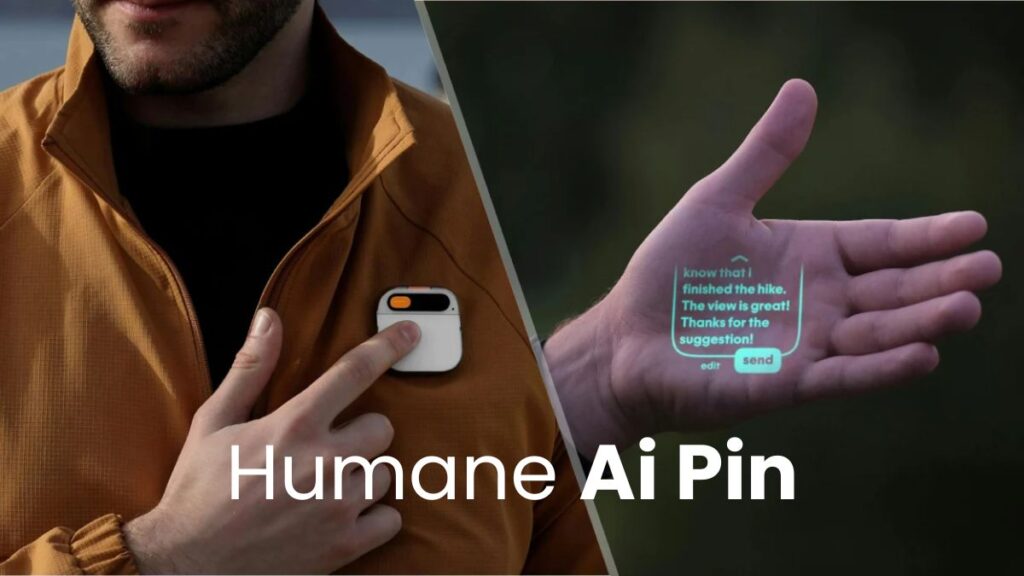
Founders Preparing Employees for Humane AI Pin Review Outcomes
Days before gadget reviewers evaluated the Humane AI Pin, a futuristic wearable device powered by artificial intelligence, the company’s founders, Bethany Bongiorno and Imran Chaudhri, prepared their employees for the worst. They warned that the reviews might be disappointing.
Harsh Reviews and Initial Reception
Their concerns were validated. In April, reviewers harshly criticized the $699 product that Humane had been promoting for a year. Some described the AI Pin as “totally broken” with “glaring flaws,” while one reviewer even called it “the worst product I’ve ever reviewed.”
Search
Recent Posts:
- OpenAI Brings ChatGPT to be used in WhatsApp: Here’s How It Works and What You Can Do To Use It.
- Realme 14x 5G: A Budget Smartphone With Premium Features.
- Exploring Apple Genmoji: A New Era of Custom Emoji Creation.
- 2024 United States Presidential Election: Donald Trump Declares Victory in 2024 Presidential Election
- Chancellor Olaf Scholz’s Visit to India: Advancing Indo-German Cooperation on Defense, Trade, and Regional Stability.
Potential Acquisition and Fundraising
Just a week after the unfavorable reviews, Humane entered talks with HP about a potential acquisition valued at over $1 billion, according to three individuals familiar with the discussions. Other potential buyers have shown interest, but discussions have been informal, and no formal sales process has commenced.
Humane enlisted Tidal Partners, an investment bank, to assist with these discussions while also managing a new funding round that would value the company at $1.1 billion. These developments signify a major setback for Humane, which had positioned itself as a leading contender in the AI hardware space. Even with securing $240 million in funding from notable Silicon Valley backers and dedicating five years to developing the device, the company has encountered setbacks.
Struggles and Internal Challenges
As of early April, Humane had garnered around 10,000 orders for the AI Pin, falling significantly below its target of selling 100,000 units by the end of the year. The company has also faced employee departures and had to revise its return policy due to canceled orders. Recently, Humane advised customers to stop using the AI Pin charging case because of a fire risk associated with its battery.
Comparisons with Industry Giants
Over the past two years, major tech companies have also faced challenges with AI products. Google introduced and then scaled back AI search features that gave bizarre recommendations, Microsoft touted a Bing chatbot that produced hallucinations, and Samsung added AI features to a smartphone that were inconsistent.
Founders’ Response and Vision
Bongiorno and Chaudhri, who are married, declined to comment on potential sales or fundraising for Humane. They affirmed that their ambitions for the AI Pin remain unchanged but acknowledged the difference between testing a device and using it in real-world conditions. Reflecting on the product reviews, Chaudhri noted, they “definitely wish that we were able to resolve some of those things a little bit differently.”
Insights from Employees and Advisors
This account of Humane’s journey is based on interviews with 23 current and former employees, advisers, and investors who requested anonymity due to concerns about retaliation or lack of authorization to speak publicly. Many expressed that Chaudhri and Bongiorno preferred positivity over criticism. They observed that a senior software engineer was terminated following the expression of concerns about the product, while others departed due to feelings of frustration.
Founders’ Background and Product Concept
Chaudhri and Bongiorno, both former Apple employees, founded Humane in 2019 with the goal of creating a lapel pin that clips to clothing. The device provides users with access to an AI-powered virtual assistant capable of sending messages, searching the web, or taking photos. It also features a laser that projects text onto the palm for tasks such as skipping a song while playing music, along with a camera, speaker, and cellular service. From the beginning, employees said, the AI Pin had issues, which reviewers later highlighted.
Technical Challenges and Workarounds
One major issue was the device’s laser display, which consumed a significant amount of power and caused the pin to overheat. To address this, Humane executives often used ice packs to cool the device before demonstrating it to potential partners and investors. Such measures, though common in early product development, highlighted the challenges the company faced.
Addressing Feedback and Improving the Product
Following the critical reviews, Bongiorno said, “We pulled the team together, and we said, ‘OK, look, this is going to be painful. We’re going to have to lean into painful feedback.'” Bongiorno and Chaudhri stated that Humane has since worked on the issues. The startup has added more voice navigation options and sound effects to enhance usability. Recent updates include integrating OpenAI’s newest chatbot, GPT-4.0, and improvements to the battery life by 25 percent, along with reducing the device’s response time to two seconds.
Verdict
Humane’s journey with the AI Pin has been tumultuous, marked by harsh reviews and significant internal challenges. Despite the setbacks, the company is actively addressing feedback and making strides to improve its product. With potential acquisitions and new funding rounds on the horizon, Humane continues to push forward in its quest to revolutionize AI-powered wearables.
To read more topics, please visit: https://insightfulbharat.com






